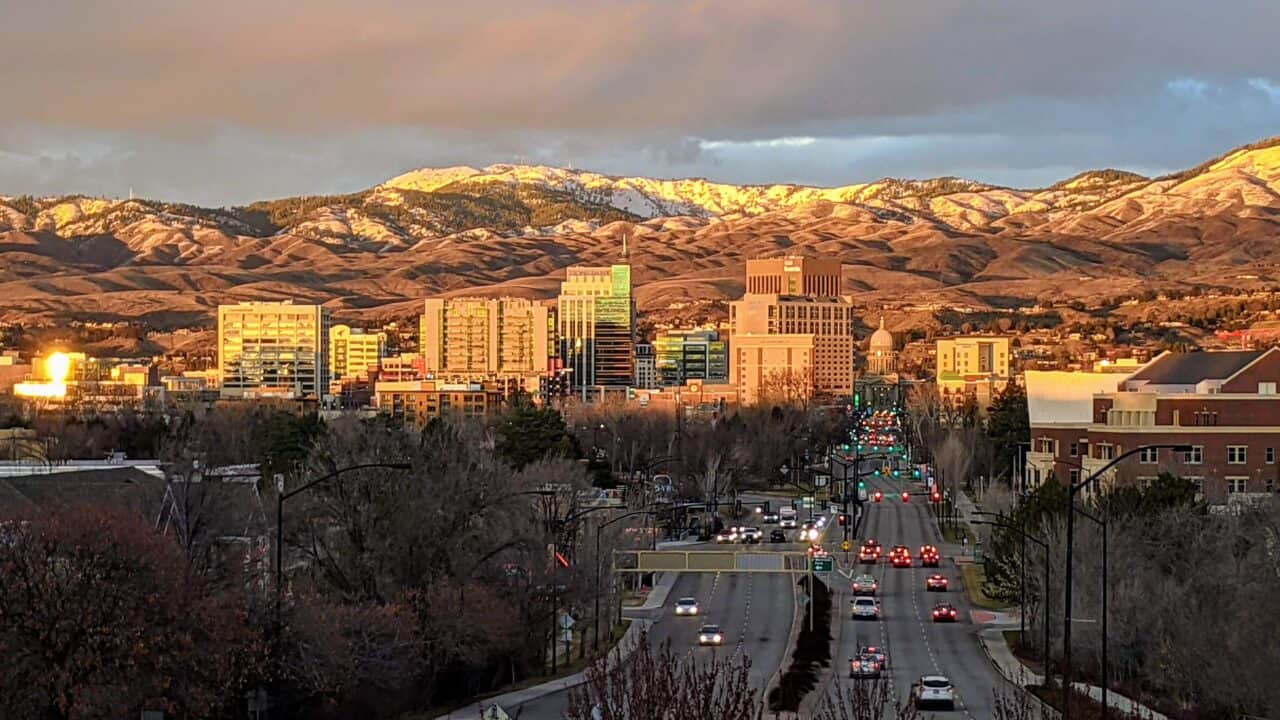 Downtown Boise in the winter of 2021 by Jyoni Shuler is licensed under Creative Commons Attribution-Share Alike 4.0 International
Downtown Boise in the winter of 2021 by Jyoni Shuler is licensed under Creative Commons Attribution-Share Alike 4.0 International
In the early winter months of 2022, members of the non-profit Reclaim Idaho were hard at work circulating petitions to put a flagship education funding measure on the November ballot. The measure, known as the Quality Education Act, would provide an additional $323 million for public schools in Idaho.
Where would the money come from? The Quality Education Act creates a brand-new tax bracket for individuals earning over $250,000, setting the top personal income tax rate at 10.925% – far higher than the current top rate of 6%. It also imposes a 33% increase in the corporate tax rate to 8%, giving Idaho a higher rate than New York, Oregon, and all its regional competitors.
Voters will officially decide on whether to impose these new tax hikes in November. The only problem? This February, Governor Brad Little signed into law the largest tax cut in Idaho state history. House Bill 436 consolidated the five income tax brackets to four and reduced rates to 1%, 2%, 4.5% and 6%, in addition to reducing the corporate tax rate from 6.5% to 6%.
By inadvertently reprinting old income tax brackets that utilize higher 2021 rates, the Quality Education Act threatens to totally reverse the historic tax cuts enshrined in HB 436. This momentous outcome was likely not the intention of the organizers – Reclaim Idaho had drafted the wording months before February’s tax cuts were signed into law – but the final measure that will appear on the November ballot nevertheless references the older, higher rates.
Luke Mayville, a co-founder of Reclaim Idaho, thinks that only the changes underlined in the initiative text should be applied by the law, rather than the full language that includes the 2021 tax levels. He said, “There is no evidence in our initiative of legislative intent to alter the lower brackets.”
Officials versed in the process, however, disagree. Chief Deputy Attorney General Brian Kane wrote that “the ballot measure reverses recent tax cuts… in the 2022 legislative session.” Deputy Secretary of State Chad Houck agreed: “Do any of us have the authority to change the language to remove that conflict and the answer there was, at least for our office, no.” Instead, it would be up to the legislature to amend the law, itself a difficult operation, to re-adopt the 2022 changes. Thus, the Quality Education Act threatens to raise taxes on all taxpayers in Idaho, including low- and middle-earners, and reverse a promising trend in the state that began in 2021 with the consolidation of income tax brackets from seven to five.
The problems don’t stop there, as the measure deals with inflation in truly incomprehensible terms. By inflation-indexing the proposed new top tax bracket using a base year of 2024, rather than the current standard of 1998, the law would overstate existing liability owed on the first $249,999 of income. On top of that, after taking the 2022 tax cuts into account, earning one additional dollar of income would increase one’s tax liability by a whopping $1,319 under the new measure.
Worse yet, the ballot measure indexes inflation in the wrong direction by inverting the correct equation. Instead of kicking in at the real value of income as it changes over time, the new top rate will progressively lower the $250,000 threshold, applying the new 10.925% income tax rate to more taxpayers every year.
For example, the Tax Foundation notes that if the U.S. experienced 8.5% inflation, an inflation adjustment using the correct equation would set the threshold for the top income tax bracket at $271,000. But since the measure mind-bogglingly divides by the inflation rate instead of multiplying, that kick-in would instead come at a lower threshold of $232,000. Assuming an inflation rate of 2.5% annually, in 10 years, all Idahoans earning over $195,000 would be paying the higher rate. This is patently absurd and reveals the dismal quality of the measure’s wording.
The Quality Education Act would not only create a huge new tax cliff for both businesses and individuals, but reverse hard-won tax reform for low and middle-income earners, and, through pure negligence, extend a new sky-high tax burden of 10.925% onto progressively lower earners. Idaho voters should overwhelmingly reject this careless and regressive ballot measure on November 8.

